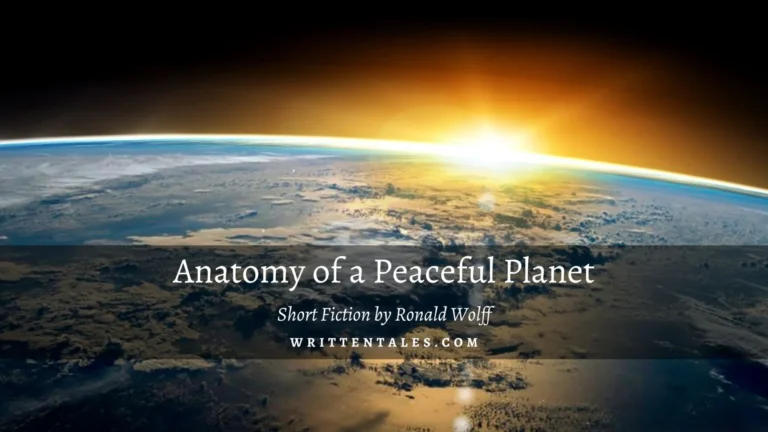Short Fiction by Ronald Wolff
May 14, 3158 TO: Inhabitants of Earth (if any) FROM: Tactical Advance Assessment Team RE: Planet 5C893
Although we grieve for your tragedy, we are concluding our investigation and transmitting our report nevertheless, hoping that it might someday reach a newly evolved, receptive audience.
A few days ago, having entered a geosynchronous orbit, we initiated our assessment of the physical, sociological, medical, and evolutionary study of Planet 5C893, discovered six hundred years ago and scheduled for a Priority 1 exploration in view of initial earth-based astronomical observations.
The planet appears to be the closest “sister” to Earth ever discovered in the Milky Way, with a topography and size closely resembling our own. One notable difference is the atmosphere, which consists primarily of harmonium (53%), logeekium (28%), and amourium (18%)—elements found on Earth in only trace amounts.
Our AI telecommunications robot, Edward III, quickly acquired the ability to translate messages from 5C893 inhabitants into English. The communications were friendly and genial, with no signs of hostility or subterfuge. We informed our new friends that our mission was scientific and peaceful.
Reassured by what we had discovered so far, we touched down the following day. We immediately started wearing the helmets provided by our hosts, obviously intended to enable us to survive in an atmosphere inhospitable to humans.
The creatures who welcomed us appeared almost identical to earthlings, except for distended upper bodies and rounded, substantially larger heads. They were slightly shorter than the average earth-human—especially the men. They transported themselves using legs similar to ours and engaged easily in conversation, using robots similar to our advanced Edward model. Their faces radiated happiness.
A man with a soothing voice, surrounded by similar creatures who used fluid, amiable gestures to communicate, invited us to sit at a large round table and feast on a cornucopia of dishes that represented every possible variety of ethnic food available on earth. Having subsisted on our years-long journey on flavorless and uninspired protein and vegetable powder churned to resemble a fast-food milkshake, we happily indulged. We paid little attention to the instruments the creatures pointed at us, always from a respectable distance. The results of their investigations, whatever they might have been, created considerable chatter—none of which was immediately translated for our benefit.
At the conclusion of our meal, the host said his name was Solon, chief of the Tourist Bureau, and offered to show us around and answer any questions we might have. He led us from the tranquility of our lunch spot, which resembled a small park, into a thriving city. Every breath we took felt fresh and invigorating, like the oxygen given to people undergoing surgery in earth-bound hospitals. During this casual walk, we ascertained some interesting facts about 5C893 and its inhabitants.
The planet’s population exceeds one billion by a small margin. The surface area all lies within the boundary of a single country governed by a supreme council, supplemented by similar groups in charge of matters more of local interest. The sociological foundation of 5C893 appears to be respect and equality. The planet has no experience with global warfare or abusive treatment of people or animals. Their language contains no words synonymous with murder, rape, jealousy, or greed. Common interest drives the collective effort to produce goods and services required for general survival.
Surprised by the lack of competition and conflict, we asked for their theory of the derivation of such an unusual culture.
Solon delivered his reply in a manner that addressed both our primal curiosity and our desire for scientific authenticity. “Evolution itself resolved that issue for us millions of years ago. Our planet’s atmospheric composition has translated into simple yet profound biological and psychological differences between the organisms of earth and 5C893.” He paused and gazed at us momentarily. “Shall I go on? You may not enjoy everything you hear.”
We all nodded enthusiastically.
“According to our observations, parts of your earthbound brains are devoted to animosity and aggression—colloquially referred to by your psychiatrists as the “hate circuit.” Similar structures in our brains have nearly disappeared. We’ve also acquired far greater ability than earthlings to modify internal connections based on current experience, enabling us to behave more in accordance with adult learning than childhood misconceptions. Our cerebral cortex, generally responsible for thinking and logic, has developed into the most powerful component of our brains. Similarly, the hypothalamus, responsible in part for sexual pleasure, has become marginally larger, corresponding in the male of the species with tiny penises and only one testicle—sufficient for reproduction but unable to generate unnecessary levels of pernicious hormones or insidious virility.”
Solon had just finished his explanation when an associate ran up and whispered in his ear. His face acquired an ominous look, and he scrutinized each member of our party with the utmost concern. “I’m afraid I have some disquieting news from your earth,” he said. “Just prior to your arrival at 5C893, civilization on your planet was destroyed by a sequence of gigantic nuclear explosions occasioned by a colossal war between the two most contentious countries. You cannot go back. Most of the inhabitants are dead, and the others are dying from radiation poisoning. I’m sorry.”
Solon’s report elicited in our group a combination of shock, fear, and grief at the loss of beloved partners, children, and friends. But after a brief period of recovery, we asked the obvious question: Could we stay on 5C893?
Solon consulted with the supreme council via some inscrutable instantaneous methodology, followed by undecipherable conversations with the 5C893 beings gathered around him. “You can stay if you adapt to the components of our atmosphere,” he reported. “And the men will need to undergo a fairly simple physical operation.”
The women immediately nodded their consent. All the men eventually agreed as well, not without some trepidation.
This concludes our report. We hope to hear from you.
Ronald Wolff’s short stories have appeared in one anthology and several literary journals, and his photographs have been exhibited at museums and special events in Virginia, Colorado, and California. Ron lives in Claremont, California, with his dog Cooper.





2 thoughts on “Anatomy of a Peaceful Planet”
It could happen if we earthlings have misunderstood physics thoroughly and there is a reachable planet close enough to visit and it has a humanoid population.
It’s Doug Hawley. I keep forgetting this site gets it wrong every time.